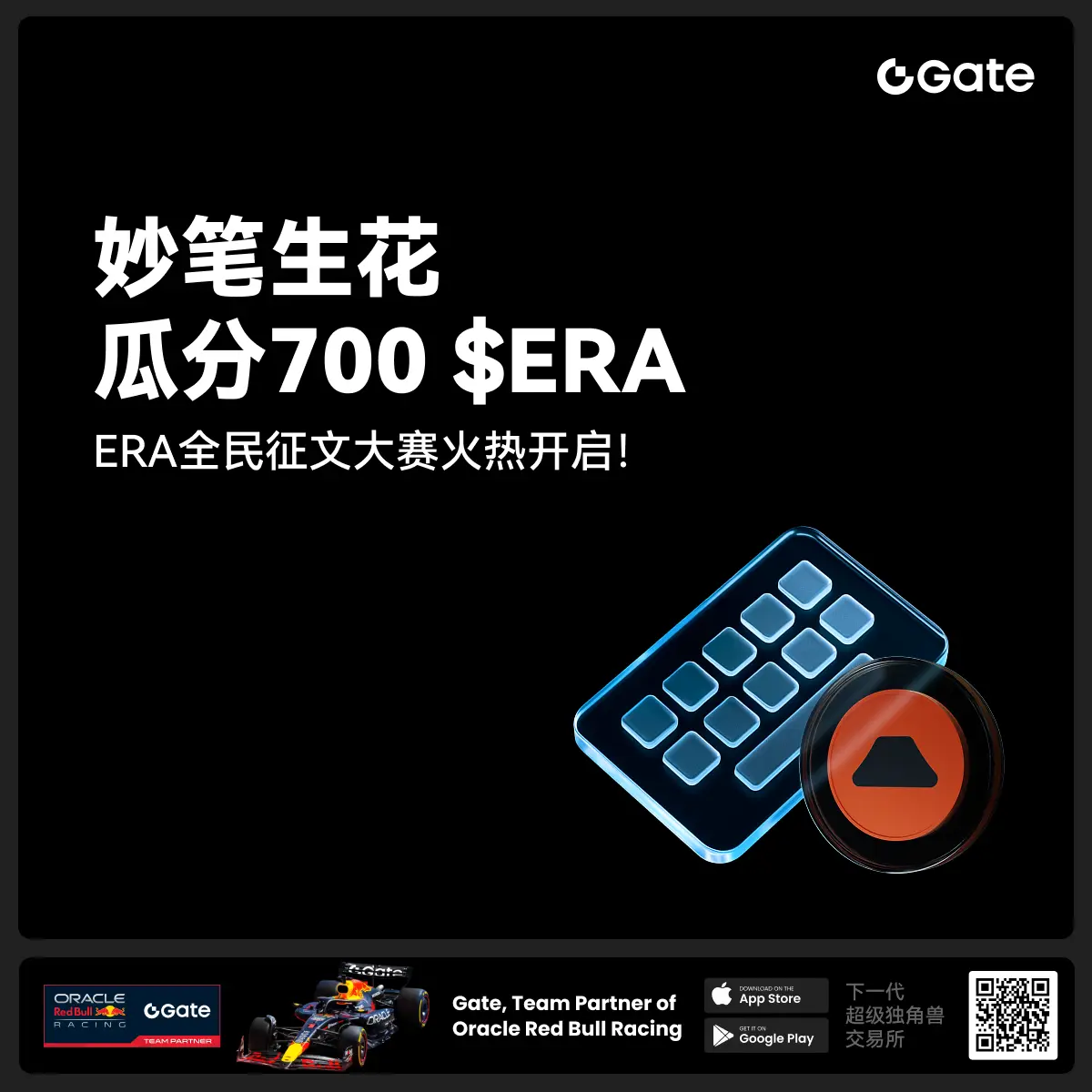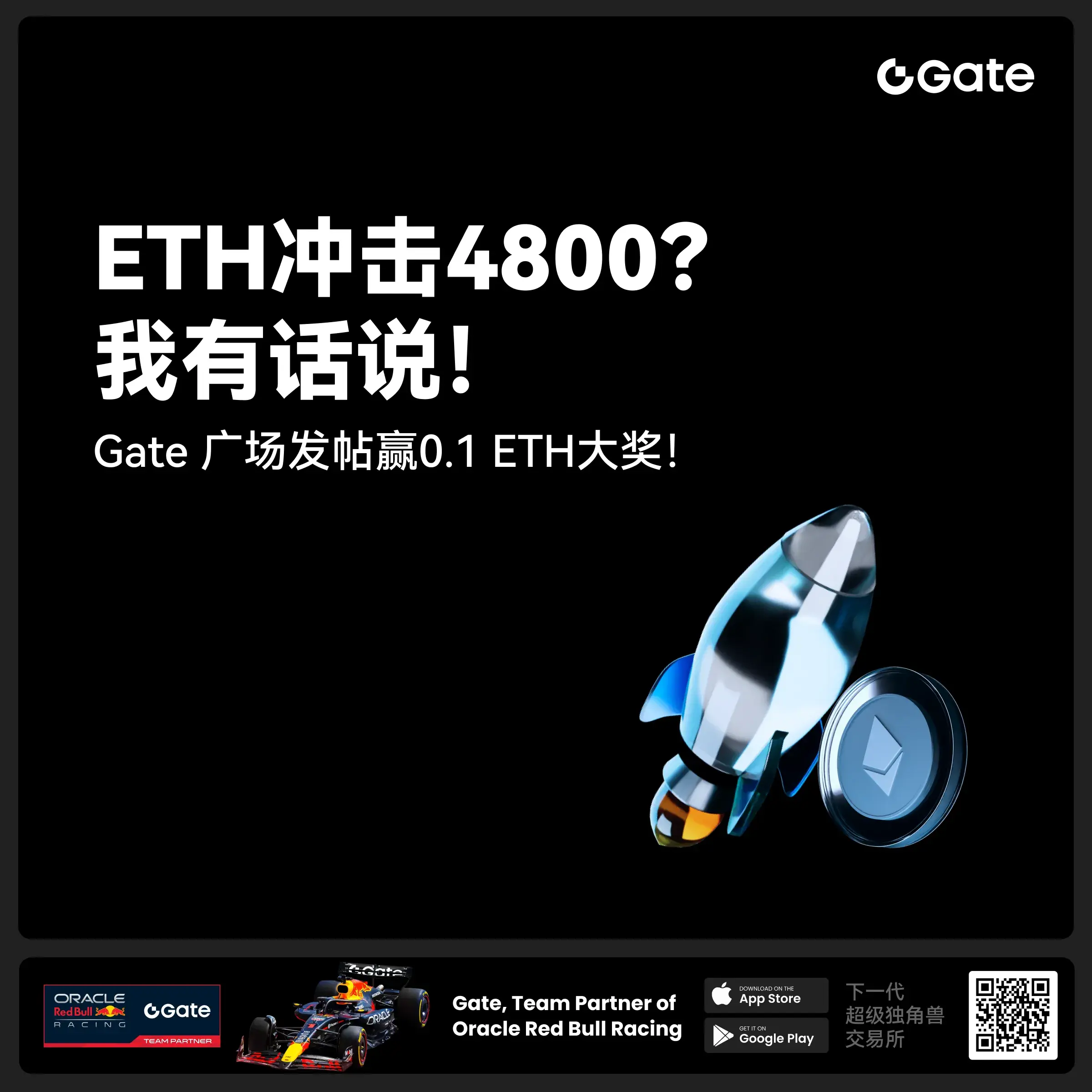更多
- 話題1/3
25203 熱度
11061 熱度
20136 熱度
24411 熱度
16362 熱度
- 置頂
- 🎉Gate 2025 上半年社區盛典:內容達人評選投票火熱進行中 🎉
🏆 誰將成爲前十位 #Gate广场# 內容達人?
投票現已開啓,選出你的心頭好
🎁贏取 iPhone 16 Pro Max、限量週邊等好禮!
📅投票截止:8 月 15 日 10:00(UTC+8)
立即投票: https://www.gate.com/activities/community-vote
活動詳情: https://www.gate.com/announcements/article/45974
- 📢 #Gate广场征文活动第二期# 正式啓動!
分享你對 $ERA 項目的獨特觀點,推廣ERA上線活動, 700 $ERA 等你來贏!
💰 獎勵:
一等獎(1名): 100枚 $ERA
二等獎(5名): 每人 60 枚 $ERA
三等獎(10名): 每人 30 枚 $ERA
👉 參與方式:
1.在 Gate廣場發布你對 ERA 項目的獨到見解貼文
2.在貼文中添加標籤: #Gate广场征文活动第二期# ,貼文字數不低於300字
3.將你的文章或觀點同步到X,加上標籤:Gate Square 和 ERA
4.徵文內容涵蓋但不限於以下創作方向:
ERA 項目亮點:作爲區塊鏈基礎設施公司,ERA 擁有哪些核心優勢?
ERA 代幣經濟模型:如何保障代幣的長期價值及生態可持續發展?
參與並推廣 Gate x Caldera (ERA) 生態周活動。點擊查看活動詳情:https://www.gate.com/announcements/article/46169。
歡迎圍繞上述主題,或從其他獨特視角提出您的見解與建議。
⚠️ 活動要求:
原創內容,至少 300 字, 重復或抄襲內容將被淘汰。
不得使用 #Gate广场征文活动第二期# 和 #ERA# 以外的任何標籤。
每篇文章必須獲得 至少3個互動,否則無法獲得獎勵
鼓勵圖文並茂、深度分析,觀點獨到。
⏰ 活動時間:2025年7月20日 17
- 📢 ETH衝擊4800?我有話說!快來“Gate廣場”秀操作,0.1 ETH大獎等你拿!
牛市預言家,可能下一個就是你!想讓你的觀點成爲廣場熱搜、贏下ETH大獎?現在就是機會!
💰️ 廣場5位優質發帖用戶+X瀏覽量前5發帖用戶,瓜分0.1 ETH!
🎮 活動怎麼玩,0門檻瓜分ETH!
1.話題不服來辯!
帶 #ETH冲击4800# 和 #ETH# 在 廣場 或 K線ETH下 圍繞一下主題展開討論:
-ETH是否有望突破4800?
-你看好ETH的原因是什麼?
-你的ETH持倉策略是?
-ETH能否引領下一輪牛市?
2. X平台同步嗨
在X平台發帖討論,記得帶 #GateSquare# 和 #ETH冲击4800# 標籤!
把你X返連結提交以下表單以瓜分大獎:https://www.gate.com/questionnaire/6896
✨發帖要求:
-內容須原創,字數不少於100字,且帶活動指定標籤
-配圖、行情截圖、分析看法加分,圖文並茂更易精選
-禁止AI寫手和灌水刷屏,一旦發現取消獎勵資格
-觀點鮮明、邏輯清晰,越有料越好!
關注ETH風向,創造觀點價值,從廣場發帖開始!下一個牛市“預言家”,可能就是你!🦾🏆
⏰ 活動時間:2025年7月18日 16:00 - 2025年7月28日 23:59(UTC+8)
【立即發帖】 展現你的真知灼見,贏取屬於你的ETH大獎!
- 🎉【Gate 3000萬紀念】曬出我的Gate時刻,解鎖限量好禮!
Gate用戶突破3000萬!這不僅是數字,更是我們共同的故事。
還記得第一次開通帳號的激動,搶購成功的喜悅,或陪伴你的Gate週邊嗎?
📸 參與 #我的Gate时刻# ,在Gate廣場曬出你的故事,一起見證下一個3000萬!
✅ 參與方式:
1️⃣ 帶話題 #我的Gate时刻# ,發布包含Gate元素的照片或視頻
2️⃣ 搭配你的Gate故事、祝福或感言更佳
3️⃣ 分享至Twitter(X)可參與瀏覽量前10額外獎勵
推特回鏈請填表單:https://www.gate.com/questionnaire/6872
🎁 獨家獎勵:
🏆 創意大獎(3名):Gate × F1紅牛聯名賽車模型一輛
👕 共創紀念獎(10名): 國際米蘭同款球員衛衣
🥇 參與獎(50名):Gate 品牌抱枕
📣 分享獎(10名):Twitter前10瀏覽量,送Gate × 國米小夜燈!
*海外用戶紅牛聯名賽車折合爲 $200 合約體驗券,國米同款球衣折合爲 $50 合約體驗券,國米小夜燈折合爲 $30 合約體驗券,品牌抱枕折合爲 $20 合約體驗券發放
🧠 創意提示:不限元素內容風格,曬圖帶有如Gate logo、Gate色彩、週邊產品、GT圖案、活動紀念品、活動現場圖等均可參與!
活動截止於7月25日 24:00 UTC+8
3
Solana驗證者陷入收益與效率博弈困境:延遲區塊成新策略?
By Jack Kubinec
Compiled by: TechFlow
As Solana’s code issues have been gradually resolved over the past few years, block times (the time it takes for the network to generate a new block of transactions) have dropped significantly, even below its nominal 400 milliseconds.
However, over the past month, an interesting trend has emerged: the median block time (a key performance indicator in the blockchain network, reflecting the speed at which the blockchain network processes transactions and generates blocks) has surged, and Solana has slowed down the rate at which it adds new transactions to the blockchain. The reason is a new validator strategy, which suggests that it may be more profitable to generate blocks slowly. According to Blockworks, Anza, Jito, and Marinade are considering solving this problem.
Each Solana block has a validator that takes on the role of leader — responsible for collecting transactions, creating blocks, and broadcasting them to the network. Leaders collect transaction fees for creating blocks. More order flow means more opportunities for fees, so a validator might choose to process a transaction in 500 milliseconds instead of 300 milliseconds to increase earnings.
At a basic level, some Solana validators appear to be waiting as long as possible to get more transactions into blocks and maximize their revenue. This behavior has led to an increase in Solana’s cycle length.
This is obviously not an ideal situation for a network that aims to be as fast as Nasdaq. In addition, fewer periods means less opportunity for compounding of staking rewards, a point made by Max Kaplan, CTO of Sol Strategies.
Solana provides a mechanism called grace ticks, which is a delay period that allows a leader to still successfully submit a block. This mechanism is designed to prevent validators in remote locations from being unfairly penalized, but it also opens the door for validators to intentionally delay submitting blocks.
Additionally, Solana’s alternative client, Frankendancer, recently released a revenue-maximizing scheduler.
According to Kaplan, validators running the client appear to be packing blocks at a slightly slower rate than normal. However, Kaplan added that Frankendancer’s delays are negligible compared to more severe delayers and he does not consider this a “bad thing.” In addition, block delays are not a new concept on proof-of-stake blockchains. However, the Firedancer upgrade may make this strategy more prominent on Solana. Jump has not yet commented on this.
Interestingly, Firedancer software engineer Michael McGee described this phenomenon on the Lightspeed podcast this week. He mentioned: “One thing we’re seeing with current validators is that…[validators] tend to create more profitable blocks by delaying transaction execution.”
Blockworks Research analyst Victor Pham noted that Solana validators with more noticeable block delays are often running modified versions of the Agave-Jito client.
For example, in mid-June, during epoch 802, Galaxy and Kiln both had median block times of over 570 milliseconds. Some unflagged validators also ran slower, while Temporal’s validators had a median block time of 475 milliseconds, according to Solana Compass data.
Kiln co-founder Ernest Oppetit acknowledged that its validator — the sixth-largest staked validator on the Solana network — had been delaying block slots for a period of time, but said that this behavior has now stopped.
“At Kiln, we pride ourselves on offering the highest APY on the market without sacrificing security. We are constantly doing R&D on different parts of our stack, including our timing strategy, and are in ongoing discussions with clients, client teams, and the foundation. Currently, we follow the spec and no longer delay blocks, but many other validators still do so. We believe that the incentive problem (fast block generation leads to reduced rewards) ultimately needs to be solved at the protocol level,” said Oppetit.
“I can say that we are not the reason people are aware of this,” said Ben Coverston, director of engineering at Temporal, when asked about his validators’ apparent participation in the slow block trend.
A Galaxy spokesperson said: “As a service provider, we support validator configurations that prioritize maximizing customer staking rewards. On Solana, this may mean proposing slightly slower blocks to ensure higher rewards. Galaxy has been responsive to community feedback and has adjusted block times to be within acceptable ranges.”
However, there is widespread consensus among the Solana validator community that slowing down the network is not appropriate, and slow validators are currently facing public backlash.
They may soon face more substantial penalties. According to Blockworks, Jito plans to blacklist slow validators from its staking pool, which is the largest on the Solana network.
Brian Smith, president of the Jito Foundation, said the organization is “drafting a governance proposal to give a committee the power to remove stragglers from the JitoSOL delegation set. This proposal should be open to the community for discussion within a few days.”
Marinade co-founder Michael Repetny said the staking pool provider is “considering bringing this up as a governance proposal to discuss the pros and cons of making [slow validators] a hard rule/delegation policy violation.”
Protocol-level solutions are also being worked on. Anza’s GitHub repository shows a new proposal that suggests cutting Solana’s grace tick period in half. In addition, Solana’s proposed consensus mechanism reform is also expected to solve this problem.
“Alpenglow will solve this problem by enabling the ability to skip voting,” said Brennan Watt, vice president of core engineering at Anza.
Watt revealed in a recent episode of the Lightspeed podcast that Anza hopes to have Alpenglow live on mainnet before the Solana Breakpoint conference in December this year.